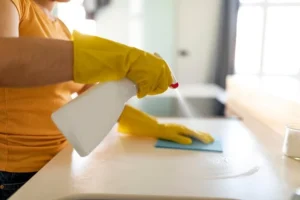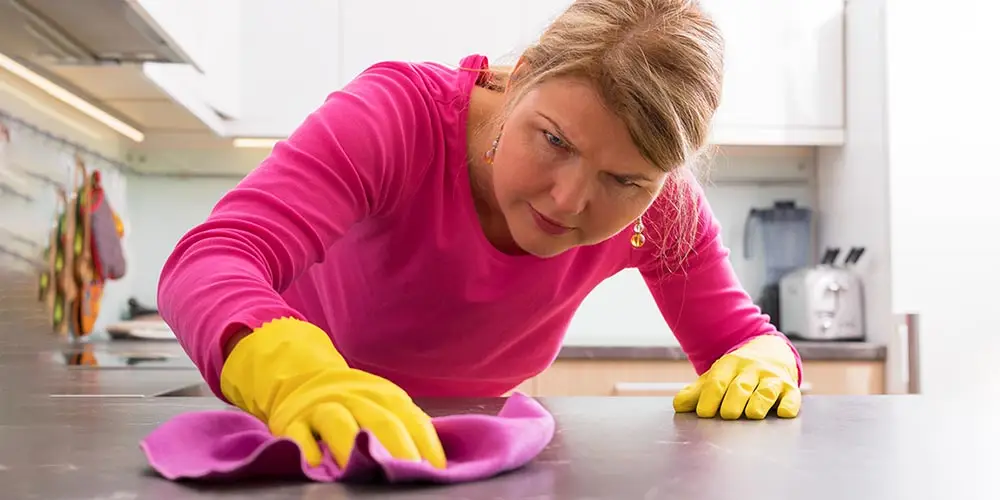Do you find yourself scrubbing down your kitchen for the 10th time this week or constantly washing your hands until they’re raw? Well, you might be dealing with more than just a strong preference for cleanliness. Obsessive-Compulsive Disorder (OCD) is a complex mental health condition that affects millions worldwide, and one common manifestation is OCD cleaning rituals.
These aren’t just habits; they’re compulsions that can take over your life, driven by intense anxiety and fear. In this blog, we’re diving deep into the world of OCD cleaning. From identifying triggers to effective treatment strategies and practical tips for managing symptoms, we’re covering all the bases to help you understand and tackle OCD cleaning rituals head-on. So, let’s dive in!
Contents
What Do You Mean By OCD Cleaning?
Obsessive-Compulsive Disorder (OCD) is a condition where individuals experience unwanted and intrusive thoughts, known as obsessions, which lead to repetitive behaviors or mental acts, called compulsions. These compulsions are performed in an attempt to alleviate the distress or prevent the feared outcomes associated with the obsessions. A common form of OCD involves cleaning rituals, deeply rooted in fears of contamination, germs, and a profound need for order and cleanliness.
The Connection Between OCD & Cleaning
 Now, within the spectrum of OCD behaviors, cleaning rituals stand out as one of the more common manifestations of the disorder. The connection between OCD and cleaning is rooted in the fear of contamination and a deep-seated need for order and cleanliness.
Now, within the spectrum of OCD behaviors, cleaning rituals stand out as one of the more common manifestations of the disorder. The connection between OCD and cleaning is rooted in the fear of contamination and a deep-seated need for order and cleanliness.
Individuals with OCD cleaning compulsions are often driven by intense anxiety about germs, dirt, or disorder. This leads to excessive cleaning and sanitizing behaviors, far beyond what is considered necessary for typical hygiene or tidiness.
These rituals are not simply about preferring a clean environment; they’re about trying to control or eliminate the overwhelming distress caused by obsessive fears. Unlike everyday cleaning, these compulsions can consume significant amounts of time, significantly interfere with daily functioning, and lead to physical harm, such as skin irritation or damage from excessive washing.
What Do Individuals With This OCD Do? Examples
 Individuals with OCD that manifests in cleaning rituals often engage in behaviors that go well beyond typical cleanliness practices, driven by their need to mitigate anxiety about contamination and germs. Here are some symptoms of what people with this type of OCD might do:
Individuals with OCD that manifests in cleaning rituals often engage in behaviors that go well beyond typical cleanliness practices, driven by their need to mitigate anxiety about contamination and germs. Here are some symptoms of what people with this type of OCD might do:
- Repeatedly washing hands to the point of causing skin irritation or damage, often with very hot water and harsh soaps, due to fears of germs.
- Constantly cleaning, scrubbing, and disinfecting surfaces like countertops, door handles, and bathroom fixtures, sometimes several times a day or for hours at a time.
- Steering clear of public spaces or objects touched by others, such as public restrooms or handrails, to avoid contact with perceived contaminants.
- Washing clothes, linens, and even cleaning items repeatedly out of fear that they might be contaminated.
- Throwing away belongings believed to be contaminated and impossible to clean thoroughly.
- Limiting or outright banning visitors to their home to prevent the introduction of outside contaminants.
- Use gloves, masks, or other protective gear inside the home to avoid direct contact with surfaces, despite no real risk of contamination.
Remember, these behaviors, while they might bring temporary relief from anxiety, are time-consuming, often impair daily functioning, and can significantly impact the individual’s quality of life and relationships.
Cleanliness OCD Test: Are You Showing Signs?
Wondering if your cleaning habits might be a sign of OCD? This simple self-assessment can help you identify potential OCD-related behaviors. While this isn’t a diagnostic tool, it can indicate whether you should consider seeking professional advice. Answer ‘Yes’ or ‘No’ to the following questions:
- Do you find yourself cleaning more than is necessary for a typical, clean environment?
- Are you unable to resist the urge to clean or wash, even when you know it’s excessive?
- Do thoughts of contamination or dirt occupy your mind throughout the day?
- Have you avoided social situations or public places to prevent coming into contact with germs?
- Do you spend several hours a week cleaning or thinking about cleaning?
- Do your cleaning rituals interfere with your daily responsibilities or relationships?
- Do you feel distressed when you’re unable to clean?
- Have you repeated cleaning tasks (e.g., washing hands, wiping surfaces) because you feel they weren’t done perfectly the first time?
- Do you use cleaning to relieve feelings of anxiety or discomfort?
- Do you feel a sense of incompleteness if everything around you isn’t perfectly clean?
If you answered ‘Yes’ to more than five of these questions, it might be time to consider seeking help. Remember, obsessive cleaning and fears of contamination are common symptoms of OCD, but you don’t have to manage them alone.
How to Break the Cycle of OCD Cleaning?
 Breaking the cycle of OCD cleaning rituals involves adopting practical strategies that address both the compulsions and the underlying anxiety driving them. Therefore, here are effective ways to start regaining control:
Breaking the cycle of OCD cleaning rituals involves adopting practical strategies that address both the compulsions and the underlying anxiety driving them. Therefore, here are effective ways to start regaining control:
- Start by slightly reducing the frequency of your cleaning rituals.
If you’re used to washing your hands or cleaning a surface multiple times an hour, try to extend the time between cleans. - Allocate a specific amount of time for cleaning activities and gradually decrease this time.
Use a timer to enforce these limits and challenge yourself to stick within these boundaries. - When the urge to clean arises, engage in an activity that occupies your mind and hands.
This could be anything from reading, drawing, doing puzzles, or any hobby that diverts your attention away from the compulsion to clean. - Delay the urge to clean for a set period, starting with just a few minutes and increasing the time gradually.
Practice mindfulness exercises and relaxation techniques such as deep breathing, meditation, or yoga to help manage anxiety levels without resorting to cleaning.
Breaking free from OCD cleaning rituals is challenging but entirely achievable. With the right strategies and support. Remember, recovery is a process that involves patience, persistence, and often professional guidance.
When to Seek Professional Help?
 If your OCD cleaning rituals are significantly impacting your daily life, relationships, and overall well-being, it’s crucial to seek professional help. Recognizing when your efforts to manage on your own aren’t enough is a vital step toward recovery. Here’s how to know it’s time and what to do next:
If your OCD cleaning rituals are significantly impacting your daily life, relationships, and overall well-being, it’s crucial to seek professional help. Recognizing when your efforts to manage on your own aren’t enough is a vital step toward recovery. Here’s how to know it’s time and what to do next:
Signs It’s Time to Seek Help:
- Your cleaning rituals consume a substantial part of your day.
- You’re unable to complete work or household responsibilities due to cleaning behaviors.
- Your relationships are suffering because of the stress and time spent on OCD rituals.
- You feel trapped by your cleaning routines, and they’re a major source of distress.
Techniques Used in Treatment
- Cognitive-Behavioral Therapy (CBT)
CBT helps identify and challenge the thought patterns fueling OCD behaviors, teaching healthier ways to respond to obsessive thoughts. - Exposure and Response Prevention (ERP)
This involves gradual exposure to situations that trigger OCD compulsions, with the goal of learning to resist the urge to perform cleaning rituals. ERP is considered one of the most effective treatments for OCD. - Medication
In some cases, medications such as selective serotonin reuptake inhibitors (SSRIs) may be prescribed to help manage OCD symptoms.
Get Affordable Treatment
in conclusion, if the weight of OCD cleaning rituals is holding you back from living your life fully, remember, help is just a step away. You don’t have to navigate this journey alone. At MantraCare, we specialize in providing affordable, accessible, and effective Online OCD Counseling tailored to your unique needs. Our experienced therapists are ready to support you every step of the way towards regaining control and finding freedom from OCD. So, why wait any longer to start the journey towards a happier, healthier you? Book a trial OCD therapy session with MantraCare today.


